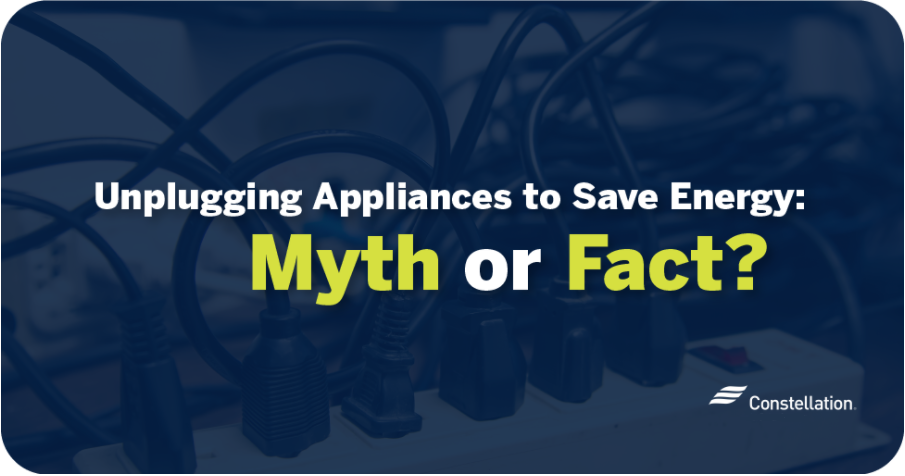The unplugging-appliances-to-save-energy myth is actually not a myth at all. If you’re wondering whether unplugging appliances saves electricity, here are some answers. We’ll delve into the details of why you definitely should unplug appliances when not in use. And we’ll show you how much energy unplugging electronics and appliances can potentially save.
Does unplugging appliances save electricity?
The fast answer to that question is yes. Take a quick walk around your home, and you might be surprised by how many devices are plugged into your walls. Unplugging appliances to save energy is no myth; it’s a fact. (You can find actual myths in this list of common energy-saving myths.)
Many modern devices sip energy even when turned off. Did you know your phone charger consumes 0.26 watts of energy with no phone connected? When your fully charged phone is left connected, use jumps to 2.24 watts. Game systems use even more energy when off. The U.S. Department of Energy calls them “energy vampires.”
How much energy does unplugging electronics save?
The answer to the question how much money does unplugging appliances save depends on how many and what kinds of appliances you have. Survey each room and unplug idle devices.
The Department of Energy estimates you could save 10% every month when you unplug appliances when not in use. Unplugging appliances can save electricity, so make it as much a habit as when you turn off the lights to conserve energy.
Electronics and appliances you should unplug when not in use
Among ways to save energy in your home, unplugging appliances when not in use is among the simplest. You aren’t getting any value from the wasted electricity, so you aren’t giving anything up.
What uses the most electricity at home? When you think about your answers, you’re likely to find that they’re also the biggest energy wasters. While every plugged-in appliance is potentially wasting energy, these tend to be the worst culprits:
- Laptops and computers. Even when you power these devices down, they consume a little power. Put them in a hibernate mode and pull the plug.
- TVs and gaming systems. Many televisions and gaming consoles are really on standby, not actually off. They do this so you can resume interaction and pick up where you left off. However, you can end up paying quite a bit for that small convenience. If you’re not using them for hours or days, consider unplugging.
- Small kitchen appliances. Unless you use them several times a day every day, unplugging appliances after every use, even if they’re energy-efficient appliances, is a good habit.
- Phone chargers. Phone chargers individually don’t waste as much energy as other devices. But since they’re typically always kept plugged in, over time, they can become serious energy vampires.
- Lamps/lighting fixtures. Old-fashioned fixtures don’t burn energy in the off position, but some of the newer models with add-ons like sound-activated operation do use energy in standby mode.
Benefits of unplugging your appliances
Because we know the answer to the question “Does leaving things plugged in use electricity?” we can now look in detail at all the benefits of unplugging appliances.
- Reduce your energy usage. When something isn’t plugged in, it can’t consume power. And that reduces the wattage you draw every month.
- Protect your appliances against power surges. When appliances are disconnected, they can’t be damaged by spikes in electricity caused by lightning, brownouts and other stresses on the grid. When you unplug, you protect your home from a power surge.
- Reduce the risk of electrical fires. The risk of fire is low when appliances are in good working order. However, appliances don’t always stay in good working order. They can be damaged by microsurges that, over time, stress their electronics. A short can happen at any time, and that can cause a fire. It’s one more reason why you should unplug unused appliances.
- Extend the life of appliances and devices. When constantly using energy, your appliances are slowly wearing out. Unplugging not only saves energy but also extends the useful life of your devices.
Other energy-saving tips for appliances
Ending energy-wasting habits at home may cut your average home power usage. Your biggest challenge is often remembering to unplug appliances. Here are some tips:
- Use smart plugs for your appliances. One of the best smart plug uses is to connect power-sucking appliances to them. Devices stay physically plugged in, but you can control the smart plug to deny them electricity.
- Invest in smart power strips. When you plug multiple devices into a power strip, you can disconnect them with one switch. Smart power strips connect devices to your smart home system.
- Upgrade to energy-efficient appliances. ENERGY STAR® appliances are exceptionally frugal when it comes to power. If you forget to unplug them, they’re drawing less power than alternative devices.
Now that you know that the unplugging-appliances-to-save-energy-myth is not a myth at all, you can start unplugging to save energy — and keep more money in your pocket.
